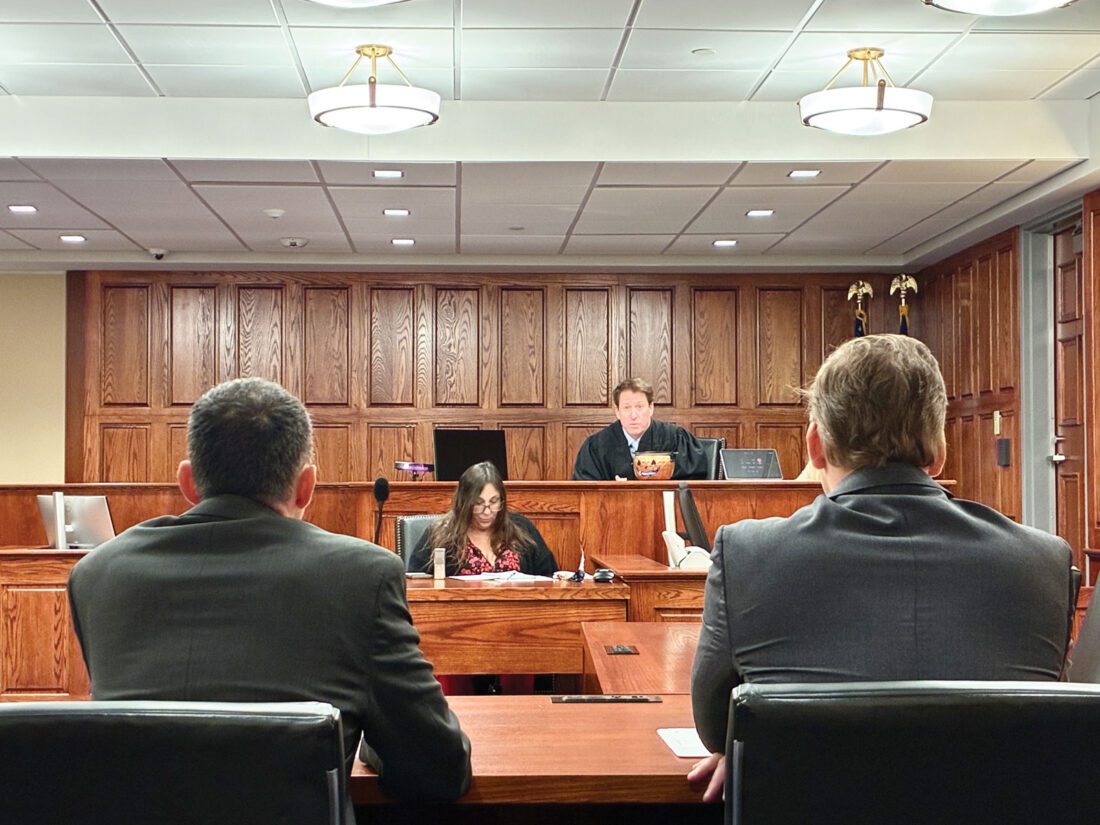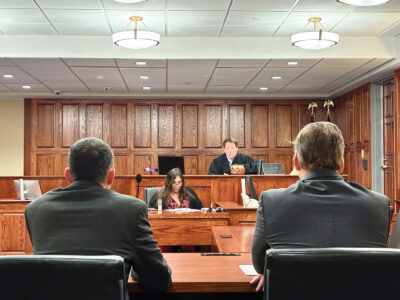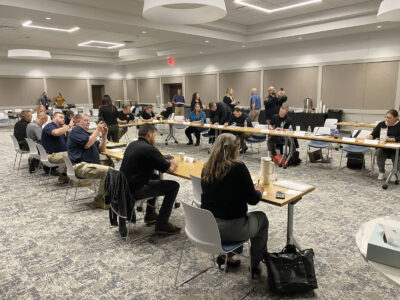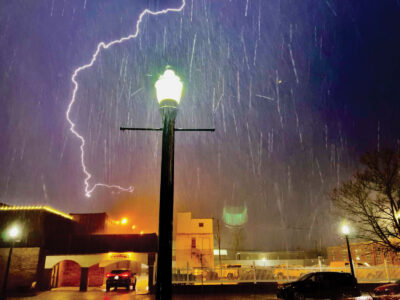Kanawha County judge dismisses religious vaccine exemption case as class action order comes out

Eighth Judicial Circuit Judge Richard Lindsay ruled Friday in favor of attorneys for the Kanawha County Board of Education by dismissing a preliminary injunction sought by a Kanawha County parent to force local school officials to accept her religious vaccine exemption. (Photo by Steven Allen Adams)
CHARLESTON — A third judge in West Virginia has ruled against the use of an executive order and the interpretation of a 2023 religious freedom law in order to create a religious exemption to the state’s compulsory vaccine law, eliminating one parent from joining a class action lawsuit.
Eighth Judicial Circuit Judge Richard Lindsay denied requests Friday morning by Kanawha County parent Nakesha Watson — who was absent for a second time — for a preliminary injunction against the Kanawha County Board of Education to force West Side Middle School to enroll her child and accept her religious exemption granted by the state Department of Health.
“The court finds that the plaintiff in this action is not likely to be successful given the fact that the compulsory vaccination law that’s at issue in this case has satisfied and passed and survived the strict scrutiny standard on multiple occasions as…determined by multiple West Virginia courts,” Lindsay said.
“In addition, the court believes that as far as this injunction, that in fact it would not be in the public interest to find for the plaintiff and grant the injunction,” Lindsay continued. “The public interest would be best served to deny the injunction and make certain that the compulsory vaccination law, which has been in place since 1937, continues to keep the children of Kanawha County healthy and safe.”
Lindsay dismissed Watson’s case with prejudice, meaning she will not be able to file the same case again. He also denied her request for emergency review and renewed emergency motion to expedite the case.
State law requires children be vaccinated against diphtheria, pertussis, tetanus, polio, measles, mumps, rubella, varicella and hepatitis B unless granted a medical exemption by the Department of Health.
But Gov. Patrick Morrisey issued an executive order in January requiring the Department of Health to grant religious exemptions, citing the 2023 Equal Protection for Religion Act (EPRA) which prohibits excessive government limitations on the exercise of religious faith.
Despite a failed attempt during the 2025 legislative session to pass a bill to codify a religious exemption within the compulsory vaccine law, Morrisey’s executive order remains in effect, prompting the West Virginia Board of Education to issue directives to all 55 county school systems to continue to abide by the compulsory vaccine law which only recognized medical exemptions.
Corey Palumbo, an attorney representing the Kanawha County Board of Education, said an executive order cannot be used to make changes to State Code. Lindsay agreed, incorporating that into his final findings.
“Even the most basic political science student or American history student understands the separation of powers,” said Palumbo, a former Senate Judiciary Committee chairman. “The Legislature makes the law, the executive administers the law, and the courts interpret the law. That’s very clear.”
“The court also finds that the Governor, through his executive order, is not empowered to make law,” said Lindsay, a former state senator. “That power is entrusted to our state legislature. In the three (years) since EPRA has become law, the Legislature has refused amendment of the CVL (compulsory vaccine law) for religious and/or philosophical exemptions. It is the Legislature’s authority to make and/or amend law and to pursue those and pass those exemptions should they arise.”
Lindsay’s ruling Friday follows similar rulings by circuit court judges in Berkeley and Mineral counties against granting preliminary injunctions for parents wanting county school systems to accept their religious exemptions. However, Fourteenth Judicial Circuit Judge Michael Froble granted a preliminary injunction for parents — led by Raleigh County parent Miranda Guzman — in Raleigh County in July.
Hearings towards granting a permanent injunction in the same Raleigh County case wrapped up earlier this month, with Froble set to make a ruling by the end of November. In the meantime, Froble released his written order Thursday turning the Raleigh County case into a class action lawsuit for the more than 570 individuals granted religious exemptions to date, as well as any religious exemptions granted in the future.
“The Guzman Plaintiffs identify several common legal and factual questions central to the validity of each class member’s claim, including whether the EPRA applies to the CVL; whether exclusion from school for non-vaccination based on sincerely held religious beliefs substantially burdens those beliefs; and whether the Guzman Defendants’ enforcement of the CVL furthers a compelling governmental interest through the least restrictive means. These issues arise from the same statewide policy and can be resolved in this action for all class members.”
However, the class action does not include those who have received religious exemptions who have final judgements in other circuit court districts. Those with religious exemptions with pending cases in circuit courts can only be part of the class action by voluntarily withdrawing their pending claims with leave of the court they filed those claims in.
In a separate ruling Friday morning, Lindsay said Froble’s class certification did not prevent him from ruling on Watson’s case.
“Because this court believes that the Kanawha County Board of Education has a responsibility to the public school children here in Kanawha County to provide a healthy and safe atmosphere…this court finds that the class certification ordered by Judge Froble does not stop or impede the court’s consideration of Miss Watson’s injunction here,” Lindsay said.





